Music legend Tansen’s life story is not entirely known to us. Known as one of the navaratnas of King Akbar’s court and a trailblazer of Hindustani classical music, whatever we know of his life is known to us through a meld of facts and fiction. Stitching together fragments of facts and fiction and presenting it through a beautiful melange of music, dance and drama, FICCI Flo Kolkata in association with Alka Jalan Foundation hosted The Trialogue Company’s popular theatre production, Tansen, at Daga Nikunj earlier this month.
Written by Mohammad Faheem and Sudheer Rikhari, directed by Sudheer Rikhari and choreographed by Ridhima Bagga, the production is shouldered by these three theatre artistes throughout, flawlessly stepping in and out of the shoes of various characters of the script. Rikhari’s interpretation of the life and works of Tansen in the play explores a journey. A journey that traces a relentless search — the search for the ultimate purpose of art in an artiste’s life.
Explored through a universal perspective of an artiste’s life, the play shows the dilemma between ishq (love) and ibadat (worship). It further delves into the dilemma between the love for one’s art and love experienced through human relationships, arriving at the crossroads of making a choice between these two, the compromises, the journey of acceptance, rejection and pain and the artiste’s struggle with ego and subsequent downfall. Parallelly, the play explores a musical journey of Hindustani classical music from its origin in the form of Dhrupad to khayal Gaayaki.
Performed for the first time at the National School of Drama in 2017, the play has travelled nationally and internationally at many places since and is gearing up for its 150th show this week. Excerpts from The Telegraph’s post-show chat with director Sudheer Rikhari on this successful production by him and his team:
What has the reception of the play been like over the years and how does it feel to perform for Kolkata’s theatre-loving audience?
We got a good response everywhere. We are still continuing with our shows. There are many reasons for doing theatre. Since we do full-time theatre, of course there is a commercial aspect to it. But to continue for so long either the audience has to like it or the ones doing it has to like it. Till now, for this play, both the audience’s liking and the performers’ liking remain the same. Even when we performed in Russia, there was a language barrier but still the reception was great. In Kolkata, we first performed at the Minerva theatre festival. There is a good and a bad thing about performing in Kolkata. People here understand theatre and music as well, so they understand and appreciate the good parts of the production and can identify the flaws, too. This is good as there is always a fear and that fear is good for an artiste as it helps us to be on our toes. It is always a pleasure to perform in front of an audience who are aware.
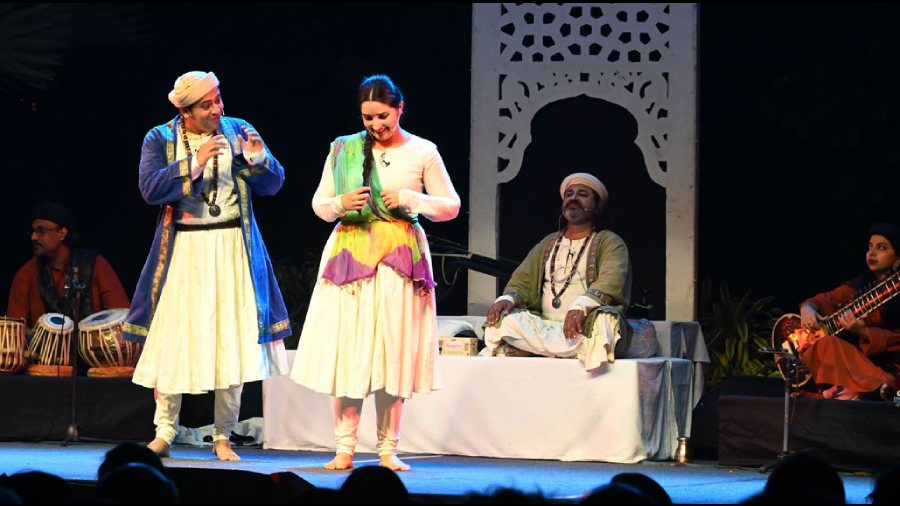
What kind of research went into such a consolidated production of the music legend’s story?
The historical facts about Tansen’s life are not there in many places. We were searching for it in Akbarnama also. Most of the things are available in stories. Then we came across Girish Chaturvedi’s Tansen. It was fiction obviously and we don’t know how much of it is facts. But since he is from Gwalior, there are many stories from there and a few didn’t match with the popular ones. We found these stories justified and interesting as an artiste’s journey and that is how we chose what to incorporate. Our main aim is to not tell the story of Tansen but to explore the questions that come up in a human’s life; Tansen is only a carrier to ask those questions. As an artiste, the kind of life he led is similar to the lives and the choices we make as artistes. That is why we kept including things that fit that line of thought.
Taani (Tansen’s adolescent lover’s character in the play) is more of a fictional character. We don’t find her mention in history as such. But for us, Taani became a very important character because whenever she comes in, she gives a new question for him to ponder upon. She pushes him in a different direction. That’s how we chose which sections to focus on.
The play explores the dilemma between ishq and ibadat as its central theme. What inspired you to take up this theme for the play?
My training is in Hindustani classical and I am an actor, too. So the start of all this is when I realised that creating a new composition or a raga is not the main journey but there’s something else that is the journey that inspires that creation and something that’s beyond it. As an actor, that question was always there. What is it that we are searching for? We do one play and it is over, the next comes up and then that is over. But what is it that we are searching? We started the play with this journey. We talked amongst ourselves as artistes. Then we thought, is it just about money or do we love our work? And the thing we love does that become our worship? Contemplating these thoughts, the idea came up. If someone does a job with a lot of indulgence, we say that work is a piece of art. Art is a space where we can indulge and work without any expectation of the outcome. The other jobs are in progress because there’s a demand for them. But the day that demand will stop, the work will also stop. So, we feel art is a space that is not produced because of demand. It is a very pure form of expression. So, we were wondering is it work or love or worship or both… and thought that every person must have faced these questions once in their lifetime. It holds true for human relationships, too.
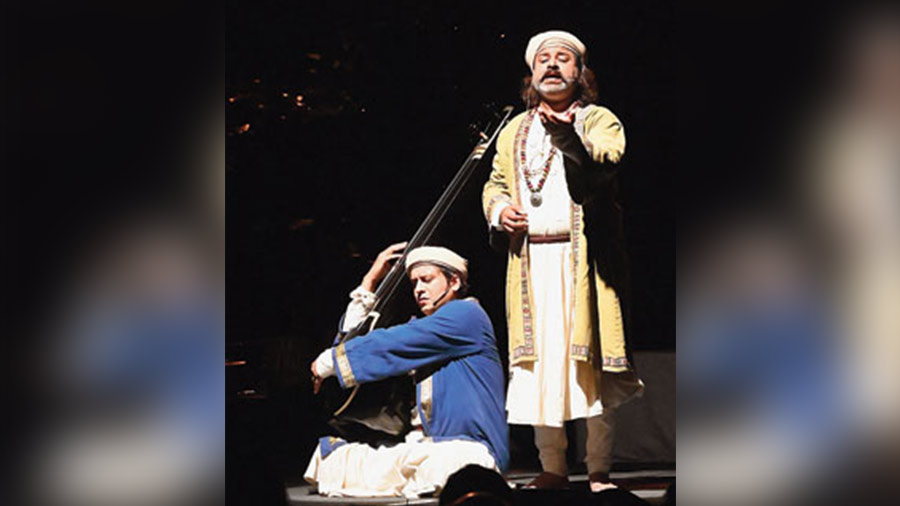
Snapshots from the performance at Daga Nikunj
The play is a three-person show. What were the challenges?
It would have been a challenge if I was not associated with music. But since I am associated with music and it is a part of my language, it wasn’t. Music is an integral part of the show. I think in that language. Initially, we were thinking if we should bring more people for the music because we were doing the script. But then we thought of doing the music on our own because the idea was to not do a production but to do something for our own search. We thought we are going to work hard and sing. For us, the aim was not to please the audience but explore the answers to the questions.
Tell us about the music in the play…
Music in the production is mixed. We incorporated some traditional compositions. Some are our own. We wanted to have this journey of music from Dhrupad to khayal. We start with Dhrupad, but end with khayal. And at the end the song that Taani sings is Tansen’s Dhrupad that is still sung but we changed that. Just like life keeps changing, music should also change. There were creative choices that we used. If it is a morning show we sing the Dhrupad in Todi but if it is a late evening show we sing in Yaman.
Did the script go through any transformations over the years?
Yes. Our aim is to not tell the story but to find answers to the questions, and in that process narrate the story in the journey. Since we prepared the script the social reality kept changing, many questions were coming up around us socially and politically. Those were included. We can’t stay without being affected by our social commotion. But then we thought, why does the quarrel exist? It is because of ego. Something which artistes also struggle with. So we thought of bringing this thought to the play. The play should provoke the audience’s thoughts and should challenge us. So, we incorporated the satirical elements and social commentary.
Pictures: Pabitra Das
Organisers speak

“The musical which fused dance, song and theatre embarked on a search for answers to questions that art provokes. There is a love story at the heart of this quest for the perfect musical note, leading to questions regarding the relationship of art to love and the many nuances of love of art, the artiste in love and art as an erotic or romantic quest and love as an artistic quest. The rendition of ragas by Rikhari and Faheem was masterful. Bagga’s dancing and singing were memorable. The actors tried to involve the audience by asking them to sing, reflect upon the meaning of music and also reflect upon how in the world today our petty sense of self is easily swamping out our humane and human inclinations. Brilliant, never to be forgotten performance! Coming together of Alka Jalan Foundation and FICCI Flo is a collaboration that makes an effort to support and present the arts in our city. A culturally evolved audience enhanced the overall success of the event,” said Alka Jalan.
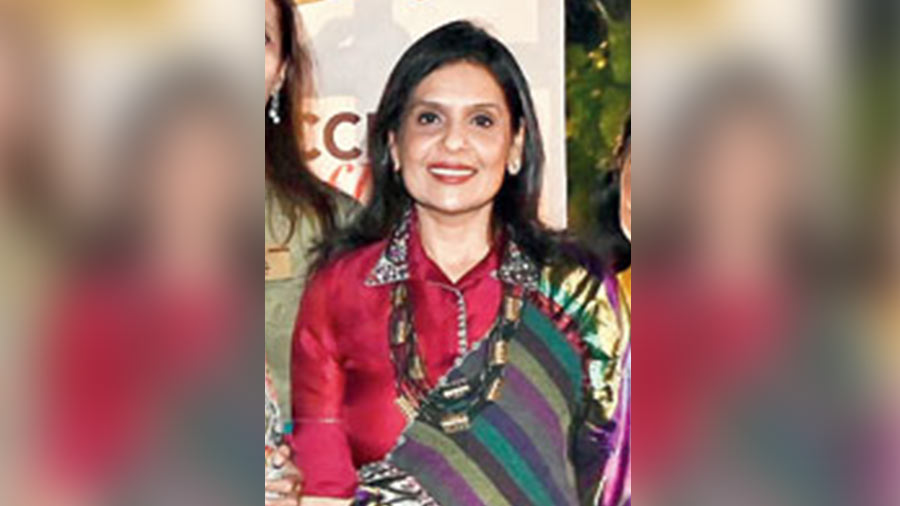
“Tansen was a beautiful depiction of every person’s journey. The search for love, knowledge, laced with the outside interventions of ego, pride, and the greed to be the best. The three artistes played several roles depicting each character to perfection. Brilliant singing, graceful dancing and immensely moving dialogues gave every person a peek into the life of Tansen. Being a theatre artiste and having performed at The Theater Olympics myself, when the opportunity came to bring Tansen, which also was among the plays which had been selected for the Theatre Olympics, I was very keen to bring it for our members. Alka Jalan Foundation was instrumental in making it happen for us,” said Sradha Saraf, chairperson FICCI FLO Kolkata.
Voices
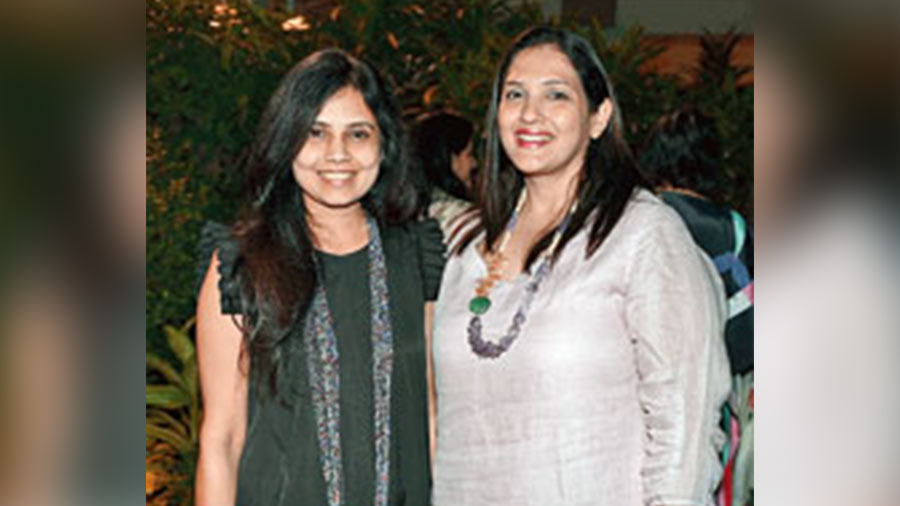
“To hold the attention of any audience is tough but Tansen play left us spellbound. I loved the way they interacted with the audience during the play and the improvisations done by the three actors. The acting, music and singing were impeccable. The open-air theatre was a refreshing experience,” said Pritee Poddar (left), who watched the play with her friend Priti Shah.
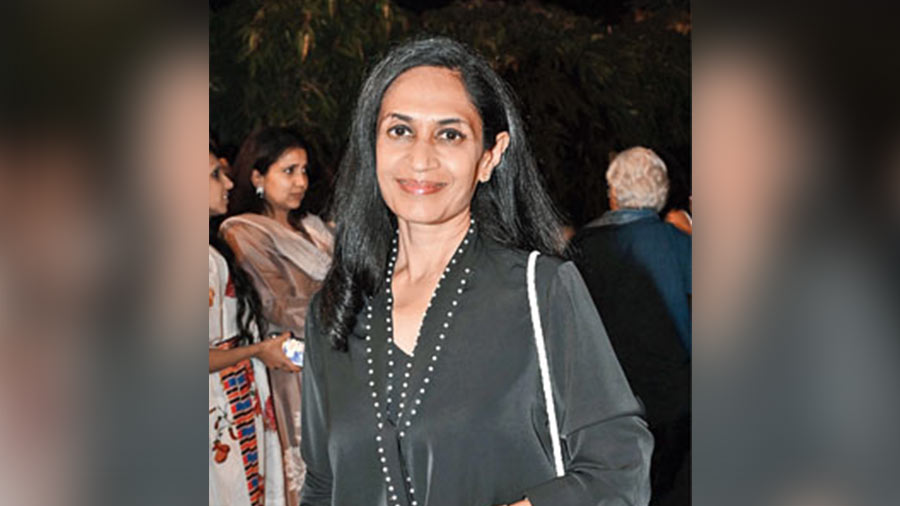
“I loved how the play blended the three major performing arts — music, dance and drama and weaved the story of Tansen’s life. The performances of the actors were par excellence and after a long time I watched a play so aesthetically portrayed,” said The Telegraph columnist Monika Poddar.
